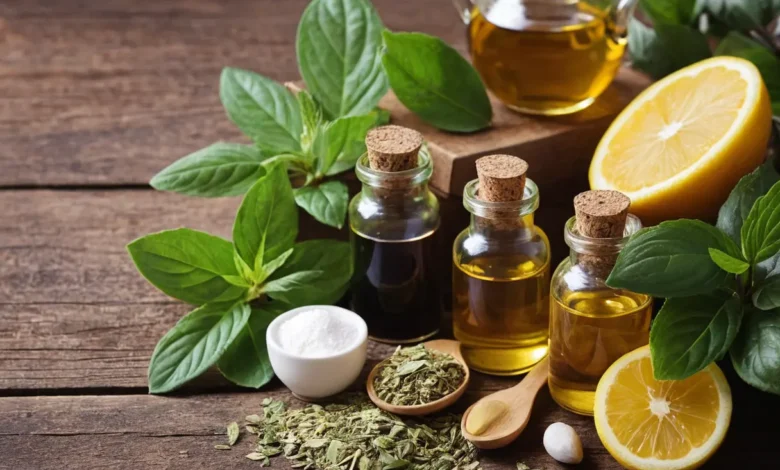Smart Ways to Ease Stress with Natural Ingredients: Relax and Rejuvenate Naturally

In today’s fast-paced world, stress has become a common issue that affects millions of people globally. Whether it’s work-related, personal, or environmental, stress can take a toll on our mental and physical health. While there are various ways to manage stress, many individuals are seeking natural, holistic methods to find relief. Fortunately, nature provides an abundance of ingredients that can help calm the mind, soothe the body, and restore balance. In this article, we’ll explore smart ways to ease stress with natural ingredients that are easily accessible and effective.
1. Lavender – The Ultimate Stress Reliever
Lavender is widely recognized for its soothing and calming properties. This fragrant herb has been used for centuries to help reduce anxiety and promote relaxation. Lavender oil is particularly popular due to its ability to alleviate tension and stress while improving sleep quality. The aroma of lavender helps calm the nervous system and can have an immediate calming effect on both the mind and body.
How to Use:
Diffuse lavender oil in your home or office to create a calming environment. You can also add a few drops to a warm bath for relaxation or apply diluted lavender oil to your temples, neck, and wrists to reduce stress and anxiety.
2. Chamomile – The Relaxing Herb
Chamomile is known for its mild sedative effects, making it a great natural remedy for stress relief. This herb is often consumed in tea form, which helps calm the body and mind. Chamomile has been shown to reduce symptoms of anxiety and improve sleep, making it ideal for those dealing with stress-related insomnia.
How to Use:
Sip a warm cup of chamomile tea before bed to unwind and ease the mind. You can also use chamomile essential oil for aromatherapy or apply it to the skin for a soothing effect.
3. Ashwagandha – The Adaptogen for Stress
Ashwagandha is an ancient herb used in Ayurvedic medicine to help the body adapt to stress and maintain balance. Known as an adaptogen, ashwagandha helps the body manage stress by regulating cortisol levels (the stress hormone). It has been shown to reduce anxiety, improve mood, and increase overall energy.
How to Use:
Take ashwagandha in capsule or powder form, either as a supplement or mixed into smoothies. For maximum benefits, use ashwagandha consistently for several weeks.
4. Lemon Balm – The Calming Herb
Lemon balm is part of the mint family and is known for its ability to reduce anxiety and promote relaxation. It has a mild sedative effect and is often used to calm the nervous system. Lemon balm is particularly beneficial for stress-related symptoms, such as nervous tension and insomnia.
How to Use:
Drink lemon balm tea or add it to other herbal blends to help ease stress. You can also apply lemon balm oil to your skin or use it in aromatherapy for a calming effect.
5. Valerian Root – The Sleep-Inducing Herb
Valerian root has been used for centuries to treat insomnia and anxiety. It works by increasing the levels of GABA (gamma-aminobutyric acid) in the brain, a neurotransmitter that promotes relaxation. Valerian root is an excellent natural remedy for those who experience stress-related insomnia or racing thoughts.
How to Use:
Take valerian root in capsule or tincture form, or brew it into a calming tea before bedtime to promote relaxation and improve sleep quality. Always consult with a healthcare provider before using valerian root, especially if you are pregnant or taking medication.
6. Peppermint – The Refreshing Stress Buster
Peppermint is known for its refreshing aroma and energizing properties, but it can also help alleviate stress and tension. The menthol in peppermint helps relax the muscles and ease tension, especially in the neck, shoulders, and head. Additionally, peppermint has been shown to reduce symptoms of anxiety and promote mental clarity.
How to Use:
Use peppermint essential oil in a diffuser to help clear your mind and relieve stress. You can also drink peppermint tea or apply diluted peppermint oil to your temples and neck to ease tension and promote relaxation.
7. Turmeric – The Anti-inflammatory Stress Fighter
Turmeric is well-known for its anti-inflammatory properties, but it also has stress-relieving benefits. The active compound in turmeric, curcumin, has been shown to reduce the production of stress-related chemicals in the body and improve mood. Regular use of turmeric can help reduce both physical and emotional stress.
How to Use:
Incorporate turmeric into your daily diet by adding it to smoothies, soups, or curries. You can also take turmeric supplements for more concentrated benefits. Turmeric latte, known as “golden milk,” is another great way to enjoy its stress-relieving properties.
8. Holy Basil – The Stress-Reducing Herb
Holy basil, also known as tulsi, is revered in Ayurvedic medicine for its ability to reduce stress and anxiety. As an adaptogen, it helps regulate cortisol levels and improves the body’s ability to cope with stress. Holy basil also has anti-inflammatory and antioxidant properties, making it a great herb for overall health and wellness.
How to Use:
Drink holy basil tea or take it as a supplement to help manage stress. You can also use holy basil oil in aromatherapy or apply it to the skin for a calming effect.
9. Rosemary – The Focus and Clarity Enhancer
Rosemary is a powerful herb known for its ability to boost focus, mental clarity, and reduce stress. It enhances circulation to the brain, which improves concentration and alleviates mental fatigue caused by stress. Rosemary also has mild sedative properties, which help relax the nervous system.
How to Use:
Diffuse rosemary essential oil in your workspace or apply diluted rosemary oil to your temples for quick relief from stress and mental exhaustion. Rosemary tea is also a great option for promoting clarity and relaxation.
10. Geranium – The Mood Lifter
Geranium essential oil is known for its uplifting and mood-boosting effects. It has a balancing effect on the mind and body, helping to alleviate stress and emotional tension. Geranium oil is especially effective for those who experience mood swings or stress due to hormonal imbalances.
How to Use:
Use geranium essential oil in a diffuser, apply it to your skin (diluted with a carrier oil), or add a few drops to a warm bath to help improve your mood and reduce stress.
Frequently Asked Questions About Natural Stress Relief
1. Are natural ingredients effective for long-term stress relief?
Yes, natural ingredients can provide long-term stress relief when used consistently. Many of these herbs are adaptogens that help your body adapt to stress over time, improving your ability to handle stressful situations.
2. Are there any side effects when using natural remedies for stress?
While natural remedies are generally safe, it’s important to consult with a healthcare provider, especially if you have underlying health conditions or are taking other medications. Some herbs may interact with certain medications or cause side effects in sensitive individuals.
3. How can I incorporate these natural ingredients into my daily routine?
You can incorporate these herbs into your daily routine by drinking herbal teas, using essential oils in a diffuser, or adding them to your meals. Many of these herbs are available in supplement form for added convenience.
Conclusion
Stress is an inevitable part of life, but with the right tools, it’s possible to manage and alleviate its effects. By using natural ingredients like lavender, chamomile, ashwagandha, and peppermint, you can create a calming environment and promote relaxation both mentally and physically. Whether you choose to sip herbal teas, diffuse essential oils, or take supplements, these natural remedies offer a safe, holistic way to reduce stress and improve your overall well-being. Try incorporating these herbs into your daily routine and experience the positive effects of stress relief, naturally.





